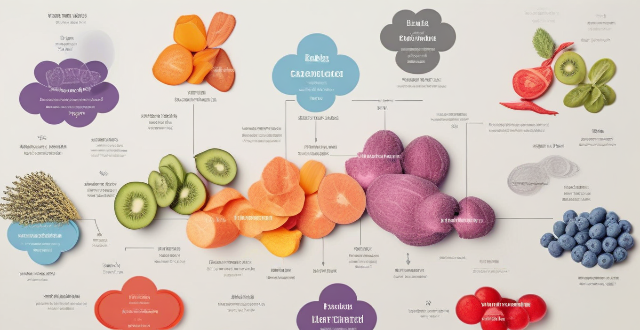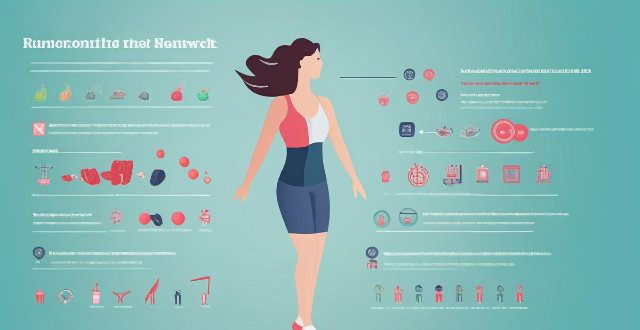Vitamin Mineral

What are the recommended daily allowances of vitamins and minerals for women ?
Vitamins and minerals are crucial for maintaining good health, and women have specific nutritional needs. The recommended daily allowances (RDA) of vitamins and minerals for adult women include various amounts of vitamins A, C, D, E, K, B-complex vitamins, and minerals such as calcium, iron, magnesium, phosphorus, potassium, zinc, copper, manganese, selenium, iodine, chromium, molybdenum, fluoride, and boron. These values are based on the average requirements of healthy adult women but may differ based on factors such as pregnancy, breastfeeding, age, and overall health. It's best to consult with a healthcare professional or registered dietitian to determine individual nutrient needs.

How does a balanced diet contribute to overall well-being ?
A balanced diet is essential for maintaining overall well-being, as it provides the body with the necessary nutrients, vitamins, and minerals required for optimal health and functioning. By consuming a variety of foods in appropriate portions, you can maintain a healthy weight, boost your immune system, support cardiovascular health, enhance brain function and mental health, promote digestive health, and support bone health. Some key nutrients that support these functions include lean protein sources, whole grains, fruits and vegetables rich in vitamins, minerals, and fiber, healthy fats found in nuts, seeds, avocados, and olive oil, omega-3 fatty acids, B vitamins, antioxidants, probiotics, calcium, and vitamin D.

What are the benefits of taking vitamin supplements for women ?
The text discusses the benefits of taking vitamin supplements for women, including improved overall health, better skin health, reduced risk of chronic diseases, boosted immune system function, and improved mental health. It also emphasizes the importance of consulting with a healthcare professional before starting any new supplement regimen.

How does a balanced diet impact women's bone health ?
Balanced diet is crucial for women's bone health, including preventing osteoporosis. Key nutrients are calcium, vitamin D, protein, and phosphorus. Fruits and vegetables also support overall well-being.

What are some common nutrient deficiencies in women and how can they be addressed ?
The text lists common nutrient deficiencies in women, including iron, calcium, vitamin D, folate, vitamin B12, magnesium, and iodine. For each deficiency, it provides symptoms and solutions such as consuming specific foods or taking supplements.

Are there specific supplements recommended for women's health upkeep ?
The article provides a summary of the top supplements recommended for women's health, including Vitamin D, Calcium, Iron, Folic Acid, and Omega-3 Fatty Acids. These supplements support bone health, muscle function, immune function, cardiovascular health, cognitive function, and overall energy levels. The article emphasizes the importance of consulting with a healthcare provider before starting any new supplement regimen to ensure safety and effectiveness.

Can certain vitamins improve athletic performance ?
Vitamins play a crucial role in various bodily functions, including metabolism, immunity, and tissue repair. Athletes often seek to optimize their performance by ensuring they have adequate vitamin intake. Certain vitamins like B-complex, Vitamin D, Vitamin C, and vitamins A, C, and E can improve athletic performance by supporting energy metabolism, muscle function, recovery, and immunity. However, it's essential to ensure an adequate intake through a balanced diet and consider supplementation only when necessary and under professional guidance. The key is to find the right balance that works for each individual athlete's unique needs and circumstances.

What prenatal vitamins are recommended for women trying to conceive ?
Prenatal vitamins are crucial for women trying to conceive, as they provide the necessary nutrients for a healthy pregnancy and support the development of a growing fetus. Some recommended prenatal vitamins include folic acid, iron, calcium, vitamin D, and multivitamins with folic acid. By ensuring adequate intake of these essential nutrients, women can increase their chances of having a healthy pregnancy and a healthy baby.

What are the essential nutrients for women's health ?
Essential Nutrients for Women's Health Women's health requires attention to various aspects of nutrition, including essential nutrients such as calcium, iron, folic acid, vitamin D, omega-3 fatty acids, vitamin B12, fiber, vitamin C, zinc, magnesium, iodine, vitamin E, vitamin A, copper, choline, selenium, and potassium. These nutrients are crucial for maintaining good health, building and maintaining strong bones and teeth, making hemoglobin, preventing neural tube defects in developing babies, supporting bone and immune system health, supporting heart health and brain function, aiding digestion, helping form collagen in skin, important for immune system function, involved in more than 300 bodily processes, essential for thyroid function, acts as an antioxidant in the body, important for vision, helps the body form red blood cells, important for brain development and health, and acts as an antioxidant in the body. A balanced diet rich in these essential nutrients is crucial for women's health, and it's important to consult with a healthcare provider or a registered dietitian to ensure individual nutritional needs are met.

Is it true that certain superfoods can boost your immune system ?
Incorporating superfoods like citrus fruits, garlic, ginger, spinach, yogurt, nuts and seeds, blueberries, and turmeric into your diet can help support immune health by providing key nutrients such as vitamin C, vitamin D, zinc, protein, and antioxidants. These foods offer a range of benefits including boosting white blood cell production, reducing inflammation, supporting digestive health, and protecting against oxidative stress. However, it's important to maintain a balanced diet and lifestyle for overall immune support.

What kind of foods should I eat to aid in muscle recovery
Eating a balanced diet that includes carbohydrates, protein, healthy fats, water, and vitamins and minerals is essential for muscle recovery after exercise. Complex carbohydrates provide energy for muscles during recovery, while protein helps repair and grow them. Healthy fats support overall health and reduce inflammation. Drinking enough water flushes out toxins and maintains a healthy fluid balance in the muscles. Vitamins and minerals, such as vitamin C, vitamin D, and iron, are also important for muscle function and recovery.

Are there any side effects of taking sports supplements ?
Sports supplements can enhance athletic performance and support recovery, but potential side effects include digestive issues from protein supplements, dehydration from creatine, increased heart rate from pre-workout stimulants, cardiovascular risks from weight loss supplements, and overdose risks from multivitamins. It is recommended to consult with a healthcare professional before starting any supplement regimen to ensure safety and effectiveness.

How does nutrition affect women's fertility ?
Nutrition plays a crucial role in women's fertility, affecting both their physical and mental health. Being underweight or overweight can negatively impact fertility, as can a diet that is too low or too high in calories. Vitamins and minerals play important roles in hormone production and metabolism, and deficiencies in certain vitamins and minerals can negatively impact fertility. Eating a balanced, healthy diet that includes plenty of fruits, vegetables, whole grains, lean protein, and healthy fats can improve overall health and fertility. Excessive alcohol consumption, caffeine intake, micronutrient deficiencies, environmental factors like pollution and exposure to toxins, stress, and smoking can also negatively impact fertility. Maintaining a healthy diet, lifestyle, and environment can positively impact women's fertility by supporting overall health and hormone balance.

What role does nutrition play in sports injury recovery ?
Nutrition plays a crucial role in sports injury recovery by providing the body with essential nutrients for tissue repair and growth. Protein, vitamins, minerals, and fluids are all important for healing, and proper nutrition can help speed up the process. In addition to nutrition, other factors such as rest, stress management, and physical therapy also play a role in sports injury recovery.

What are the key components of a healthy breakfast ?
A healthy breakfast should include a variety of nutrients to provide energy and support overall health. The key components are whole grains, protein, fruits and vegetables, healthy fats, and dairy or non-dairy alternatives. Whole grains provide complex carbohydrates, fiber, vitamins, and minerals. Protein is important for building and repairing tissues in the body. Fruits and vegetables provide essential vitamins, minerals, antioxidants, and fiber. Healthy fats are important for brain function and hormone regulation. Dairy products or non-dairy alternatives provide calcium, vitamin D, and other important nutrients. Simple combinations like oatmeal with nuts and fruit, a veggie omelette with whole wheat toast, or Greek yogurt with berries and granola can provide all the key components of a balanced breakfast.